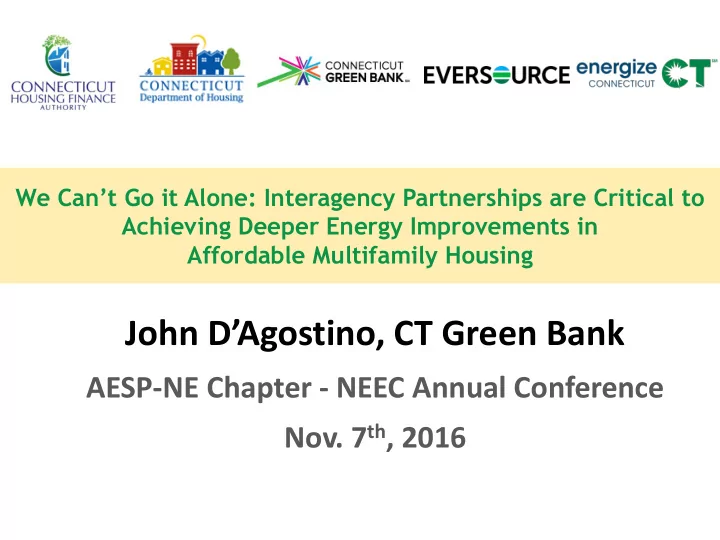

We Can’t Go it Alone: Interagency Partnerships are Critical to Achieving Deeper Energy Improvements in Affordable Multifamily Housing John D’Agostino, CT Green Bank AESP-NE Chapter - NEEC Annual Conference Nov. 7 th , 2016
Who we are and what we do Housing Agencies Green Bank Utility Companies
We are all concerned about high energy costs in Connecticut? • Energy cost savings opportunity on the order of $120,000,000 per year (conservatively) • High energy costs and very high burden for low income households; 8x energy use intensity
We have a common goal . . . . . . . to achieve comprehensive, deeper energy improvements that help owners and tenants save energy, reduce costs, increase property values, and provide healthier and more comfortable housing.
So what was the problem? • Too hard for owners • Individual agency goals and drivers differ • We share info, but processes not integrated • Not designed to achieve desired outcomes • We don’t speak a common language • We operated in silos
What we did . . . LEAN’ed Table VSM. The activities and steps, both valued and non-value added, in the current process and future desired state. Insert Picture
What we did . . . Planned
What we did . . . Integrated Processes
The result… • New process to incorporate utility incentives into state funded projects • Changes to LIHTC Qualified Allocation Plan • New pre-development and technical assistance loans
Incorporating Utility Incentives into DOH & CHFA Multifamily Projects • Synchronized Utilities staff resources with DOH/CHFA annual funding round schedule • Clearly defined process for how to incorporate utility incentives into DOH/ CHFA funding applications • Created and streamlined utility incentive application forms • Utility incentives now required with all DOH/CHFA funding applications • Ensures utility incentives are included initial project capital stack (no windfalls after project completion) • Pre-application design support available through the utilities • Regularly scheduled meetings with DOH/CHFA/Eversource/UIL
Updated LIHTC Qualified Allocation Plan • 3 points for passive house design • 2 points for high performance building design • 1 point for renewable energy systems (102 maximum points)
Start at any stage and we’ll work with you to achieve your goals Pre-Development Financing Utility Incentives & Project Financing Analyze Design and Fund viable Install Operate property engineer project upgrades and monitor performance improvements opportunity
Pre-Development financing Pre-Development Financing Sherpa Loan • Designated service provider • Standardized process/fee schedule Analyze Design and Navigator Loan property engineer performance • Client managed contractor(s) opportunity • Customized technical services
Project financing LIME Affordable Low Income Multifamily Energy Project Financing C-PACE Market-rate Commercial Property Assessed Clean Energy SOLAR Fund viable Install Operate project upgrades and monitor Solar projects only Commercial solar lease improvements
What’s next?
Recommend
More recommend